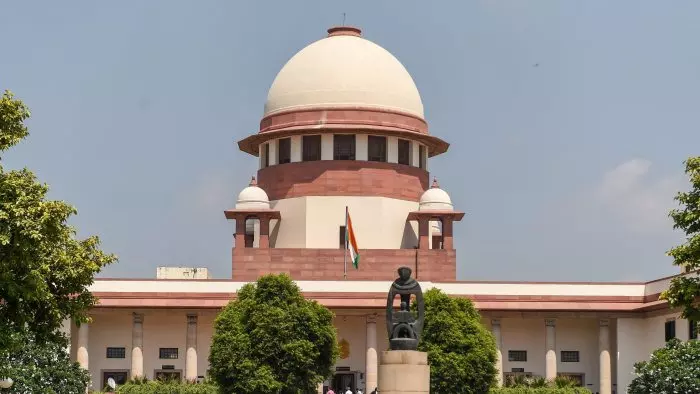SC gets two new judges amid dissent, Collegium recommends transfer of 14 High Court judges

New Delhi: The government on Wednesday cleared the appointment of Patna High Court Chief Justice Vipul Pancholi and Bombay High Court Chief Justice Alok Aradhe as judges of the Supreme Court. Their elevation brings the top court to its sanctioned strength of 34 judges, including the Chief Justice of India. The decision, however, was not unanimous, as Justice B V Nagarathna of the Collegium recorded a strong note of dissent against Justice Pancholi’s elevation, citing concerns over seniority, transfer history, and institutional credibility.
Union Law Minister Arjun Ram Meghwal made the announcement on X, stating that the President had approved the appointments after consultation with the Chief Justice of India. The notification followed a Collegium resolution adopted earlier this week. The Collegium, led by Chief Justice of India BR Gavai and comprising Justices Surya Kant, JK Maheshwari, Vikram Nath, and B.V. Nagarathna, had recommended the two names.
Justice Nagarathna expressed her dissent against the inclusion of Justice Pancholi, describing his elevation as “counter-productive” and warning that it could diminish the credibility of the Collegium system. She is reported to have underlined that Justice Pancholi was ranked fifty-seventh in the all-India seniority list of High Court judges and that several senior and equally meritorious judges had been overlooked. She also recalled that his transfer from the Gujarat High Court to the Patna High Court in July 2023 was the outcome of detailed consultations and could not be treated as a routine move. Justice Nagarathna further pointed to the fact that with his appointment, the Supreme Court would now have three judges from the Gujarat High Court.
Civil society organisation Campaign for Judicial Accountability and Reform (CJAR) issued a statement on Wednesday noting that Justice Nagarathna had raised similar concerns earlier this year. It observed that while the Collegium had in the past begun publishing detailed notes about candidates and reasons for selection, the latest resolution did not include such details. The group said, “The previous CJI had initiated a welcome practice of disclosing the background of recommended judges, whether they were related to sitting or retired judges, and the status of pending recommendations. This increased public trust in the Collegium process. Unfortunately, this level of disclosure is missing from the present decision.”
Justice Vipul Pancholi, who now stands in line to become the Chief Justice of India in October 2031, was born in Ahmedabad on May 28, 1968. He began practice in the Gujarat High Court in 1991, served as assistant government pleader and additional public prosecutor for seven years, and taught as visiting faculty at Sir L.A. Shah Law College for over two decades. He was elevated as an additional judge of the Gujarat High Court in 2014, confirmed as a permanent judge in 2016, and transferred to the Patna High Court in 2023, where he was appointed Chief Justice the same month.
Justice Alok Aradhe, born on April 13, 1964, began his career in Madhya Pradesh and specialised in civil, constitutional, arbitration, and company law. He was designated a senior advocate in 2007, became an additional judge of the Madhya Pradesh High Court in 2009, and was confirmed in 2011. He was transferred to the Jammu and Kashmir High Court in 2016 and later served as its acting Chief Justice. In 2018, he was moved to the Karnataka High Court, where he also acted as Chief Justice in 2022. He was appointed Chief Justice of the Telangana High Court in July 2023 and, six months later, was transferred to the Bombay High Court where he assumed charge in January this year.
Alongside the elevation of the two Chief Justices, the Collegium also recommended the transfer of fourteen judges across different High Courts during meetings held on August 25 and 26. Justice Atul Sreedharan has been shifted from the Madhya Pradesh High Court to the Chhattisgarh High Court, while Justice Sanjay Agrawal moves from the Chhattisgarh High Court to the Allahabad High Court. Justice J. Nisha Banu has been transferred from the Madras High Court to the Kerala High Court. Justice Dinesh Mehta and Justice Avneesh Jhingan, both from the Rajasthan High Court, have been moved to the Delhi High Court. In turn, Justice Arun Monga of the Delhi High Court has been posted to the Rajasthan High Court.
Further, Justice Sanjay Kumar Singh of the Allahabad High Court has been transferred to the Patna High Court, and his colleague Justice Rohit Ranjan Agarwal has been sent to the Calcutta High Court. Justice Manavendranath Roy of the Gujarat High Court has been shifted to the Andhra Pradesh High Court, while Justice Donadi Ramesh of the Allahabad High Court has also been posted to Andhra Pradesh. Justice Sandeep Natvarlal Bhatt of the Gujarat High Court will now serve in the Madhya Pradesh High Court. Justice Chandrasekharan Sudha has been transferred from the Kerala High Court to the Delhi High Court. Justice Tara Vitasta Ganju of the Delhi High Court has been moved to the Karnataka High Court, and Justice Subhendu Samanta of the Calcutta High Court has been shifted to the Andhra Pradesh High Court.
The transfer proposals, like the elevations, await formal approval from the government.



